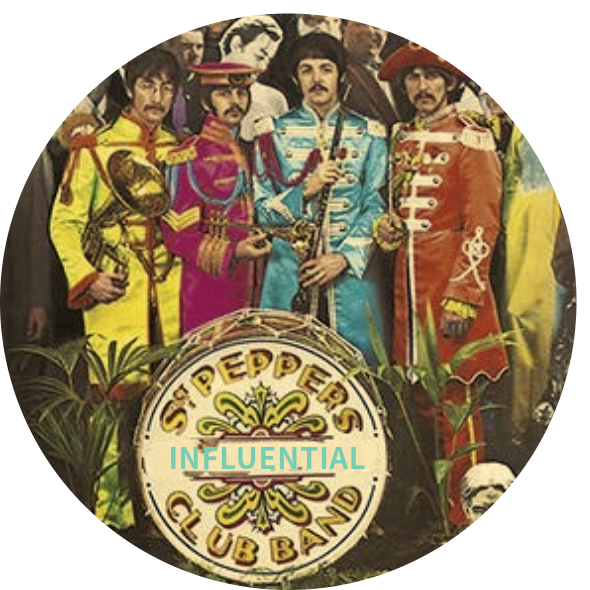
Many musicians throughout the 20th and 21st centuries are credited with changing the sounds of specific genres, inspiring how others create music, or even inventing new genres altogether. Focusing on influential mainstream bands, I selected ten—some popular, some lesser-known—that I’ve deemed the most important to the history of music. Notably, many are from the late ‘60s, a time during which music was revolutionized with new styles and sounds that are still popular to this day.
- The Beach Boys
The Beach Boys set a precedent on songwriting in popular music for generations to come. Their 1966 album Pet Sounds demonstrates how their use of harmonies, instrumental depth, intricate bass lines, and unusual instruments (such as Coca-Cola cans) established them as one of the most significant bands of the era. The album also popularized a production method known as the “Wall of Sound” to optimize the quality of the music for record players, which includes a denser sound and larger instrumentation. Songwriter Brian Wilson specifically mentioned influence from The Beatles’ previous album, Rubber Soul (1965), and The Beatles’ subsequent albums owed a great deal to Pet Sounds, with producer George Martin stating that their 1967 album, Sgt. Pepper’s Lonely Hearts Club Band “never would have happened if Pet Sounds by The Beach Boys had never been created.” The Beach Boys proved that there is more to popular music than simple formulas, thus redefining the course of the genre.
- Nirvana
Nirvana’s influence may be a bit exaggerated in the greater scheme of music, but their 1991 album Nevermind permanently changed alternative rock by making the grunge sound mainstream. This sound is characterized by a louder, more distorted guitar sound, and often rebellious lyrics, which appealed to many young fans. Their influence is evident through the many bands that emerged immediately after: Alice in Chains, Pearl Jam, and even Weezer. Furthermore, the honesty of lead singer Kurt Cobain’s lyrics shines through 21st century solo artists, such as Kid Cudi and Lana Del Ray. Although the grunge movement mostly fizzled out after Cobain’s death in 1994, its impact remains.
- Pink Floyd
Pink Floyd was a weird band. They started off using a whimsical style, embracing blues and psychedelia, and grew more progressive and experimental until they released one of the most famous and best-selling albums of all time, The Dark Side of the Moon (1973). It’s easily identified by its simple but effective album cover—an depiction of light refraction—and its mature, reflective themes on life, death, and existence. They used even more progressive sounds and song structures on their next two albums, Wish You Were Here (1975) and Animals (1977), before releasing the more pop-friendly The Wall in 1979, which became the best-selling double album of all time, and contained many of the band’s biggest hits, including “Another Brick in the Wall, Part 2” and “Comfortably Numb.” After this release, tensions between frontmen Roger Waters and David Gilmour escalated until Waters left the band in 1985, but their popularity persisted for years to come. Their sound in the ‘70s, however, had profound effects on listeners, and inspired countless musicians from Radiohead to Tame Impala. Pink Floyd’s immersive sound and lyrical themes, ranging from mortality to political criticisms, made them pioneers of progressive rock.
- N.W.A.
While it may be a bit of an anomaly on this list, no other group can boast the influence N.W.A. and its members had on the hip-hop genre. Hip-hop was becoming increasingly mainstream in the 1980s, and although N.W.A.’s in-your-face lyrics and beats enraged many parents, kids loved them. Their heavily explicit lyrics were actually banned from many radio stations, so it was especially impressive how much traction the group was able to gain. Their music discussed life as young men in Compton, California, and their anti-police anthems set the tone for hardcore hip-hop that occurred in following years. Even after N.W.A. broke up, many of its members were among the most important West Coast hip-hop figures in history. Dr. Dre, the band’s main producer, went on to popularize G-funk, revolutionizing the hip-hop world in contrast to the simultaneous grunge revolution led by Kurt Cobain.
- Led Zeppelin
Led Zeppelin is credited as one of several bands who invented heavy metal, but in reality, a number of bands had already begun using the heavier guitar sound by 1969, when Led Zeppelin’s first two albums, Led Zeppelin and Led Zeppelin II, were released. Nevertheless, they are considered pioneers of the hard rock subgenre, as well as one of the best selling bands of the 1970s. Even though they did not exactly invent hard rock, they put their own spin on it, bringing in blues and folk, as well as non-western influences, which inspired bands such as Black Sabbath and Nirvana, two bands also featured on this list.
- The Rolling Stones
The Rolling Stones were one of the first to bring British rock & roll to North America, and they helped pioneer the sound that would develop into hard rock. They led the British Invasion of America along with The Beatles in 1964, introducing the American youth to blues-inspired rock. They are cited as influences for artists like David Bowie and Jimi Hendrix, and a great number of hard rock bands, including Aerosmith and Guns N’ Roses.
- Kraftwerk
Starting as early as the 1970s, Kraftwerk were pioneers of electronic music. Even though the concept and methods by which electronic music is made have progressed considerably, Kreftwerk’s use of synthesizers, a new invention at the time, gave them a futuristic sound, and their utilization of the vocoder gave a unique robotic effect to their vocals. Electronic, dance, and synth music owes a great deal to Kraftwerk, including groups and artists such as the duo Daft Punk as well as Aphex Twin, another innovative electronic producer who cites the band as one of his biggest influences.
- The Velvet Underground
A short-lived band that was overlooked during their late 60s to early 70s run, The Velvet Underground is credited with inventing punk-rock, a subgenre that would gain popularity in the late 1970s. Their sound was notably ahead of their time, and definitely not mainstream, despite originally being managed by Andy Warhol, one of the most famous artists of the 20th century. Like several other bands from this era, critics mostly ignored and disapproved of their music, but their influence would ultimately be massive. Their debut album, The Velvet Underground & Nico, notoriously sold a mere 30,000 copies, but, as legendary musician and producer Brian Eno said, “I think everyone who bought one of those 30,000 copies started a band.” The Velvet Underground can be credited as inspiration for almost every single band of the 1970s, all without being as big a name as many of their counterparts.
- Black Sabbath
Heavy metal was invented by accident. Growing up working-class in Birmingham, guitarist Tony Iommi lost two fingers in a sheet metal factory, and it took great persuasion to convince him to pick up a guitar again. When he did, he had to modify his strings and playing style to accommodate for his injury. Ultimately, the sound that he created was a much slower, heavier one than any of the band’s contemporaries. Iommi’s down-tuned guitar, heavier riffs, and power chords played on lower strings, along with the vocals of the controversial Ozzy Osbourne, helped shape all subgenres of metal, both sonically and thematically with gloomier, more horrifying lyrics than people were used to. Metal owes a great deal to Black Sabbath with countless bands citing them as a strong influence.
- The Beatles
A predictable choice, but still a deserved one. The Beatles are largely considered the greatest band of all time, and there is ample reason why. Beatlemania—a craze that began spreading in 1964—brought the Beatles international fame, most significantly in America, where British rock & roll was increasingly becoming popular. They blew up even more from there, eventually transitioning from a more typical rock band into a blend of psychedelia, non-western music, and hard rock sounds. Their output was impressive by any standard, as they released 13 albums in only 7 years. Their musical creativity and freedom expanded with each year, leading a revolutionary era for the musical world. By the mid-1960s, before the release of many of their most significant songs and albums, such as Abbey Road, they were already being referred to as the “greatest band of all time.” The Beatles did not just inspire more musicians than anyone else; they changed the realm of music more drastically than ever before. They set new standards for recording techniques, and made the album, rather than singles, the primary method for music consumption, and their beautiful lyrics expressed more personality than those of most contemporaries. Even though the Beatles did not invent a genre, they shaped the musical and cultural landscape for decades to come.
Honorable mentions: The Smiths (indie pop), Fleetwood Mac (soft rock), Metallica (thrash metal), U2 (alternative rock), Queen (pop rock), Radiohead (art rock), AC/DC (hard rock), Daft Punk (electronic), and The Strokes (indie rock).




















